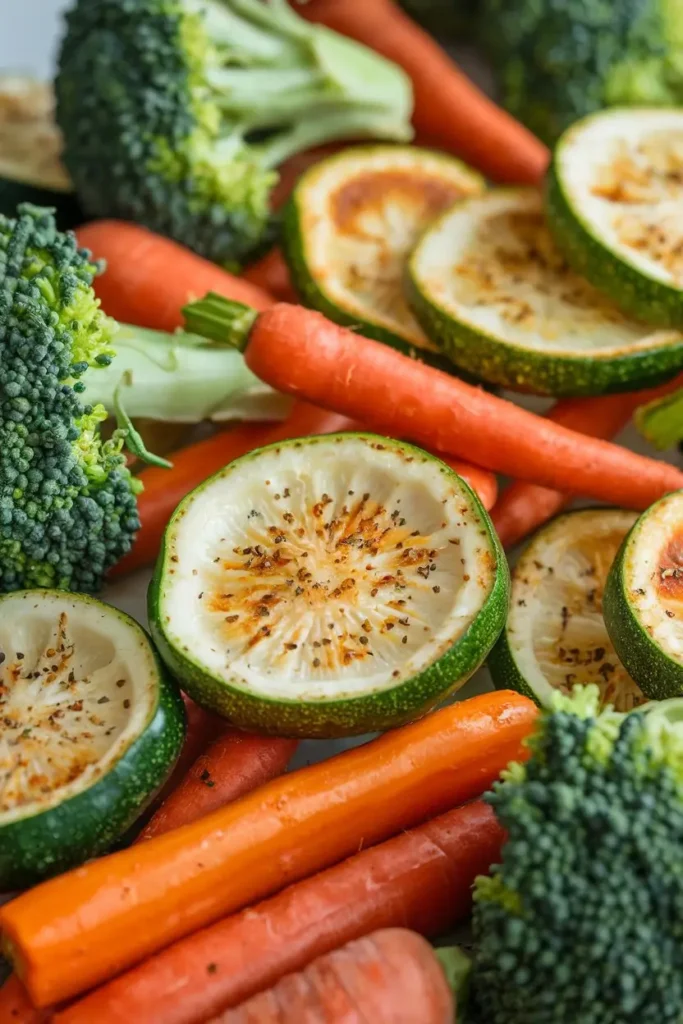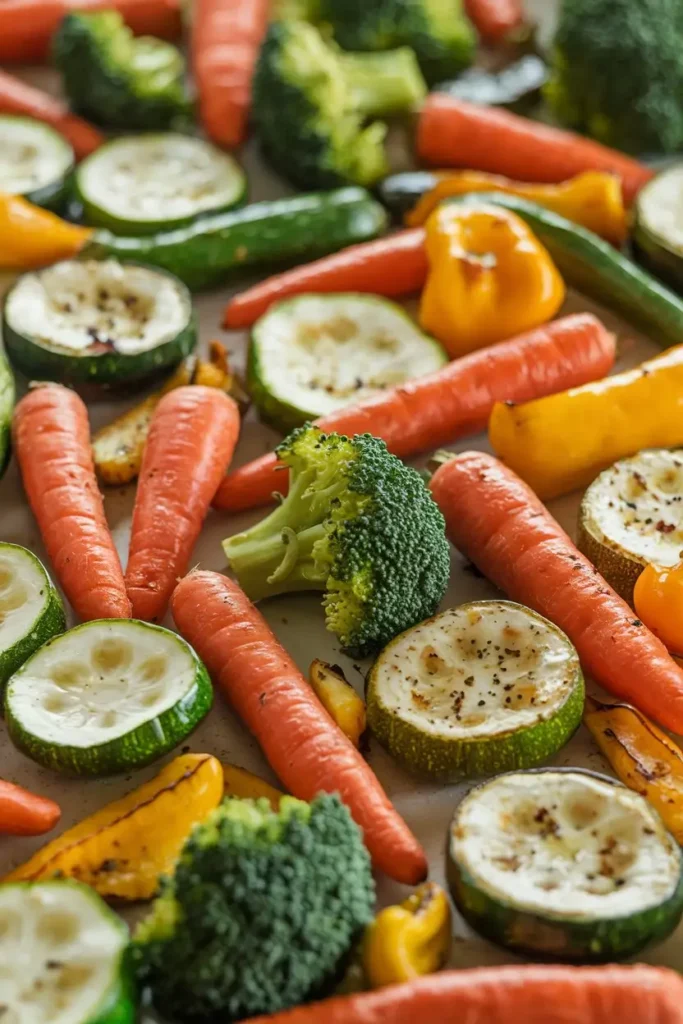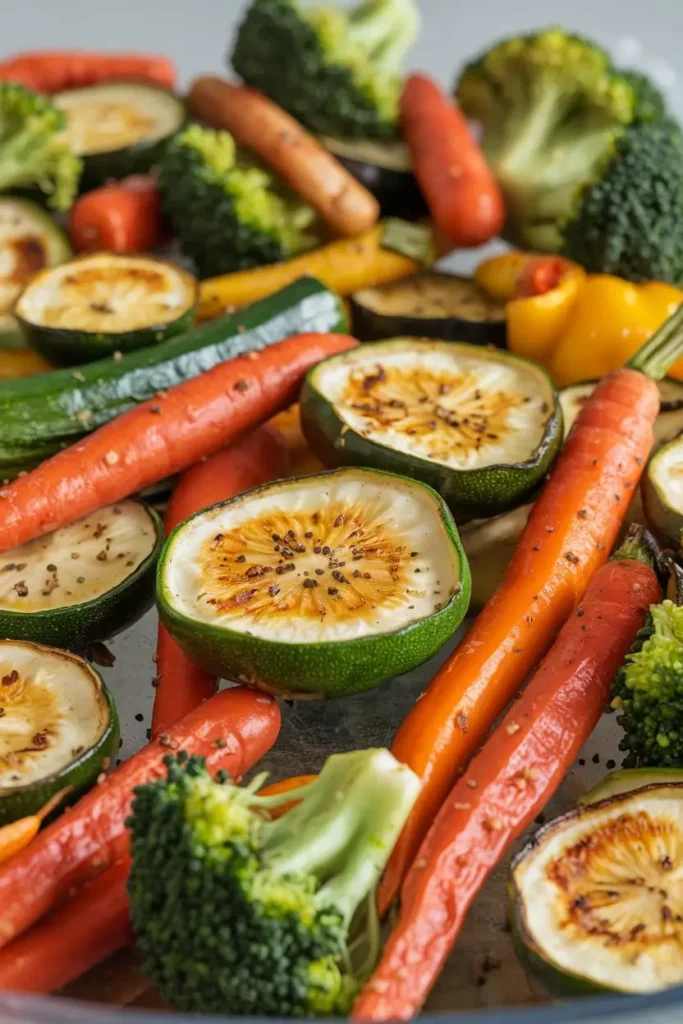Ever notice how the side dish often decides whether dinner feels routine or restaurant-level? When those greens land on the plate hot, crisp, and well seasoned, everything else just tastes better.
Air Fryer Veggie Sides You’ll Make on Repeat
Introduction
How many weeknights end with limp vegetables or a pan you have to scrub for 20 minutes? A well-tuned approach to air fryer veggie sides solves both problems. With high-speed convection heat, most vegetables brown in 8 to 15 minutes and use up to 80 to 90 percent less oil than deep-frying. That speed and efficiency make it simple to get a crisp-tender bite without babysitting a skillet. Right out of the gate, you can expect consistent results, fast cleanup, and big flavor.
Traditional oven roasting still makes magic, but air fryer vegetables cook about 25 to 30 percent faster due to concentrated airflow. Translation: better texture in less time, with fewer dishes. Below, you’ll find a flexible master method, timing guides by vegetable, health-forward swaps, and real-world tips to keep those air fryer veggie sides vibrant and satisfying.

Ingredients List
This mix-and-match base covers most vegetables that thrive in the basket. Use it as-is or apply one of the seasoning combos below.
Base recipe for 4 servings
- 6 cups bite-size vegetables, well dried
- Great options: broccoli florets, cauliflower florets, Brussels sprouts halved, carrot coins, sweet potato wedges, zucchini spears, bell pepper strips, asparagus, green beans, mushrooms, red onion wedges
- 1.5 tablespoons olive oil or avocado oil
- 1 teaspoon kosher salt
- 0.5 teaspoon black pepper
- 1 teaspoon garlic powder
- 1 teaspoon smoked paprika
Substitutions and flavor boosters
- Oil: Use olive or avocado oil for high-heat stability. For oil-free, toss with 2 teaspoons aquafaba or 1 tablespoon tahini plus 1 tablespoon water to help spices adhere.
- Salty-savory: 1 teaspoon soy sauce or tamari, or 1 teaspoon white miso whisked with 1 teaspoon water.
- Brightness: 1 tablespoon lemon juice or balsamic vinegar added after cooking to keep edges crisp.
- Crunch finish: 2 tablespoons grated Parmesan, 1 to 2 tablespoons panko, or almond flour for gluten-free crunch. Sprinkle in the final 2 minutes.
- Heat: 0.5 teaspoon red pepper flakes or 0.5 teaspoon chipotle powder.
- Sweet-savory glaze: 1 teaspoon honey or maple syrup plus 1 teaspoon Dijon stirred in right after cooking for a shiny finish.
Seasoning blends to keep on rotation
- Italian herb: 1 teaspoon Italian seasoning, 1 teaspoon garlic powder, 0.5 teaspoon onion powder, 0.5 teaspoon salt
- Taco: 1 teaspoon chili powder, 0.5 teaspoon cumin, 0.5 teaspoon smoked paprika, 0.5 teaspoon oregano
- Mediterranean: 1 teaspoon za’atar or 1 teaspoon sumac plus 0.5 teaspoon coriander
- BBQ: 1 teaspoon paprika, 0.5 teaspoon brown sugar, 0.5 teaspoon mustard powder, 0.25 teaspoon cayenne

Timing
Prep time: 10 to 15 minutes
Cook time: 8 to 16 minutes
Total time: 18 to 30 minutes
That’s about 20 to 30 percent faster than roasting in a standard oven, and most air fryers preheat in under 3 minutes compared with 8 to 12 minutes for many ovens.
Quick timing by vegetable at 390 to 400°F
- Tender veg like asparagus, mushrooms, zucchini, bell pepper: 7 to 10 minutes
- Medium-density veg like broccoli, green beans, Brussels sprouts halves: 10 to 14 minutes
- Dense veg like carrots, beets, sweet potatoes: 12 to 16 minutes
Recommended time and temperature guide
| Vegetable | Cut Size | Temp °F | Time (min) | Notes |
|---|---|---|---|---|
| Broccoli | Florets, 1.5 in | 400 | 9 to 12 | Light char, tender stems |
| Cauliflower | Florets, 1.5 in | 400 | 10 to 13 | Great with curry powder |
| Brussels sprouts | Halved | 390 | 12 to 14 | Cut larger ones into thirds |
| Green beans | Trimmed | 400 | 8 to 10 | Toss with lemon zest after |
| Asparagus | Medium-thick spears | 390 | 7 to 9 | Stop at bright green |
| Zucchini | Spears or coins | 400 | 8 to 10 | Avoid crowding to prevent sogginess |
| Mushrooms | Halved or whole button | 390 | 9 to 11 | Pat dry before seasoning |
| Carrots | 0.5 in coins | 400 | 12 to 14 | Finish with honey-chili |
| Sweet potatoes | 0.75 in wedges or cubes | 400 | 13 to 16 | Toss mid-cook for even browning |
| Bell peppers | Strips | 400 | 7 to 9 | Ideal for fajitas |
| Red onion | Wedges | 390 | 8 to 11 | Caramelizes quickly |
Tip: Air fryer wattage and basket style affect timing. Start at the lower end and add 1 to 2 minutes as needed.
Step-by-Step Instructions
Step 1: Preheat for consistent browning
Set the air fryer to 390 to 400°F and preheat for 2 to 3 minutes. A hot start kickstarts browning so spices stick and edges crisp. If your model lacks preheat, run it empty for 2 minutes.
Pro tip: If cooking dense vegetables, preheat to 400°F. For delicate items like asparagus, preheat to 390°F.
Step 2: Dry and cut vegetables evenly
Rinse, then dry thoroughly with a clean towel. Water hinders browning. Cut vegetables into similar sizes to ensure even cooking. Aim for 1 to 1.5 inch pieces for most items. Thinner asparagus cooks fast, so trim spears to similar thickness.
Pro tip: For extra-dense items like carrots, steam in the microwave for 2 minutes before air frying. This shortens cook time by 2 to 3 minutes.
Step 3: Season with a light hand on oil
Toss your vegetables with oil, salt, pepper, and selected spices. Use just enough oil to thinly coat the surfaces, about 1 to 1.5 tablespoons per 6 cups. Too much oil drips and steams the food.
Pro tip: Add sugar-containing glazes after cooking to prevent scorched spots.
Step 4: Load the basket without crowding
Spread vegetables in a loose, even layer. A little overlap is fine, but avoid a packed pile. Good airflow equals crisp edges. For 4 servings, consider two batches, especially with mushrooms or zucchini.
Pro tip: If cooking different vegetables together, pair by density. Example combos: broccoli plus peppers, carrots plus onions, Brussels sprouts plus bacon bits.
Step 5: Cook, shake, and check color
Air fry for the lower end of the timing window. Shake the basket or stir at the halfway mark to redistribute and color evenly. Look for deep golden edges. Use a fork to check tenderness.
Pro tip: If the color is right but centers need a touch more time, reduce heat by 20°F and finish for 2 to 3 minutes to protect the crust.
Step 6: Finish with acidity, crunch, or creaminess
Transfer to a bowl and taste for salt. Add a squeeze of lemon, a dusting of Parmesan, chopped fresh herbs, or a drizzle of tahini-lemon sauce. Tiny flavor accents go a long way.
Pro tip: Zest citrus directly over the hot vegetables to release aromatic oils.
Nutritional Information
Air fryer veggie sides typically deliver high fiber, plenty of micronutrients, and modest calories. Using 1 to 1.5 tablespoons oil across 4 servings adds about 30 to 45 calories per serving. Compared with deep-frying, you save several hundred calories per cup in starchy vegetables due to the dramatic reduction in oil absorption.
Approximate nutrition per serving for the base mix
- Calories: 110 to 160
- Protein: 3 to 6 g
- Carbohydrates: 15 to 25 g
- Fiber: 4 to 7 g
- Fat: 4 to 7 g
- Sodium: 300 to 450 mg depending on salt and add-ins
- Highlights: Vitamin C, vitamin A, folate, potassium, antioxidant carotenoids and flavonoids
Selected vegetable snapshot
| Vegetable | 1 cup cooked | Calories | Fiber (g) | Vitamin C (mg) | Notes |
|---|---|---|---|---|---|
| Broccoli | 1 cup | ~55 | 5 | ~80 | Sulforaphane-rich |
| Brussels sprouts | 1 cup | ~70 | 6 | ~75 | High in vitamin K |
| Cauliflower | 1 cup | ~45 | 3 | ~50 | Low carb friendly |
| Sweet potato | 1 cup | ~180 | 6 | ~3 | Beta-carotene boost |
| Green beans | 1 cup | ~45 | 4 | ~12 | Good with lemon |
Values are rounded estimates based on USDA data. Seasonings and finishes adjust totals.
Healthier Alternatives for the Recipe
- Oil-light approach: Use 2 teaspoons oil plus 1 teaspoon soy sauce or aquafaba. The liquid helps spices cling while keeping calories lower.
- Low sodium: Swap salt for a citrus-herb blend. Use lemon zest, garlic, black pepper, and fresh parsley. A pinch of nutritional yeast adds savoriness.
- High protein: Toss hot vegetables with 0.25 cup crumbled feta, shaved Parmesan, or a spoonful of hummus. For vegan protein, add toasted chickpeas in the last 5 minutes.
- Low carb or keto: Favor cauliflower, zucchini, mushrooms, asparagus, and peppers. Keep sweet potatoes and carrots for higher carb days.
- Dairy-free crunch: Use almond flour or gluten-free panko. Sprinkle in the final 2 minutes to stay crisp.
- Whole30 or paleo: Choose avocado oil, salt, pepper, garlic, paprika, and citrus. Skip sugar and soy. Coconut aminos can sub for soy sauce.
- Anti-inflammatory tilt: Season with turmeric, ginger, and black pepper. Finish with olive oil, lemon, and chopped cilantro.
Serving Suggestions
Make these air fryer veggie sides feel like an occasion.
- Weeknight bowl: Spoon vegetables over quinoa or farro with a dollop of tzatziki or tahini sauce. Add a soft egg or shredded rotisserie chicken.
- Steakhouse style: Brussels sprouts with crispy pancetta and a drizzle of balsamic. Serve alongside a pan-seared steak or portobello.
- Taco night: Peppers, onions, and zucchini tossed with taco spices. Fold into warm tortillas with avocado and salsa.
- Mediterranean plate: Cauliflower and peppers with za’atar, olives, cucumbers, and lemony yogurt. Warm pita or brown rice on the side.
- Game day snack: Buffalo cauliflower or broccoli with a blue cheese or vegan ranch dip. Finish with chopped scallions.
Personal tip: Keep a small bin of pre-cut mixed vegetables in the fridge. On busy nights, you’re one toss of oil and spices away from a complete plate.
Common Mistakes to Avoid
- Overcrowding the basket: Packed layers steam instead of crisp. Cook in two batches if needed.
- Skipping preheat: Cold starts delay browning and cause uneven doneness.
- Too much oil: Excess drips, smokes, and softens edges. Measure the oil once or twice to learn the visual cue for a light coat.
- Uneven cuts: Thick carrots next to thin peppers means one burns while the other stays firm. Keep pieces similar in size.
- Adding sugars too early: Honey or maple burns fast. Finish with sweet glazes after cooking.
- Ignoring moisture: Zucchini and mushrooms release water. Dry thoroughly and do not crowd.
- Forgetting to shake: A 50 percent stir or shake is the single easiest way to improve color and texture.
Storing Tips for the Recipe
- Fridge: Cool completely, then store in a shallow, airtight container for up to 4 days. Lids should fit snugly to prevent fridge odors.
- Reheat: Air fry at 360°F for 3 to 5 minutes until sizzling. For delicate items, 325°F works well. A microwave softens texture, so reserve that for saucy bowls.
- Make-ahead prep: Wash, dry, and cut vegetables up to 3 days in advance. Store by type with a paper towel to absorb moisture.
- Freezer: Most cooked vegetables are better fresh, but par-cooked carrots, broccoli, and cauliflower freeze decently. Re-crisp from frozen at 380°F for 6 to 8 minutes.
- Sauces on the side: Store acidic or creamy finishes separately to preserve crisp edges.
Quick Recap and Try It Today
Crisp edges, tender centers, bold seasoning, and minimal cleanup. Air fryer veggie sides deliver all that in under 20 minutes for many vegetables. Give the master method a go tonight, then share a rating or comment with your favorite combo. Want more weeknight wins? Subscribe for new recipes and tips.
FAQs
What’s the best temperature for mixed vegetables?
A range of 390 to 400°F works for most combinations. Use 400°F for dense items like carrots or sweet potatoes, and 390°F for delicate produce like asparagus or peppers.
Do I need to preheat the air fryer?
Yes. A 2 to 3 minute preheat improves browning and texture. If your model lacks a preheat button, run it empty at temperature for a couple of minutes.
How do I cook different vegetables together?
Group by density and size. Pair crunchy vegetables that cook in similar time frames, or start dense items 3 to 4 minutes earlier, then add tender vegetables for the remaining time.
Can I use frozen vegetables?
Yes, but expect more moisture. Preheat to 400°F, cook straight from frozen, and shake often. Add 2 to 4 extra minutes. Dry-finish with Parmesan or a quick broil if your unit has that setting.
Why are my vegetables soggy?
Common causes include crowding, too much oil, or watery vegetables. Dry thoroughly, use minimal oil, and spread in a single layer. A mid-cook shake helps a lot.
What oil is best?
Olive and avocado oil both handle these temperatures well and add flavor. For a neutral profile, use avocado oil. If you prefer oil-free, use aquafaba or a thin tahini-water mix to help spices adhere.
Is parchment paper safe in the air fryer?
Perforated air fryer liners are fine. Avoid regular parchment unless the food anchors it, since loose paper can contact the heating element. Never preheat with parchment alone.
How do I keep breaded vegetables crisp?
Spritz lightly with oil and cook at 400°F. Flip or shake halfway. Let them rest on a wire rack for a minute before serving, then finish with grated cheese or herbs.
Can I scale this for a crowd?
Yes. Cook in batches and hold finished vegetables in a 200°F oven on a wire rack so they stay crisp. Season a touch extra before serving to account for holding time.
What are the best dips and finishing sauces?
Try lemon-garlic yogurt, tahini with lemon and garlic, salsa verde, chimichurri, or a quick honey-mustard. Toss lightly or serve on the side to keep textures bright.
Looking for more ideas? Try air fryer broccoli with chili-lime butter, parmesan-crusted zucchini fries, or a smoky carrot and sweet potato mix for tacos.


